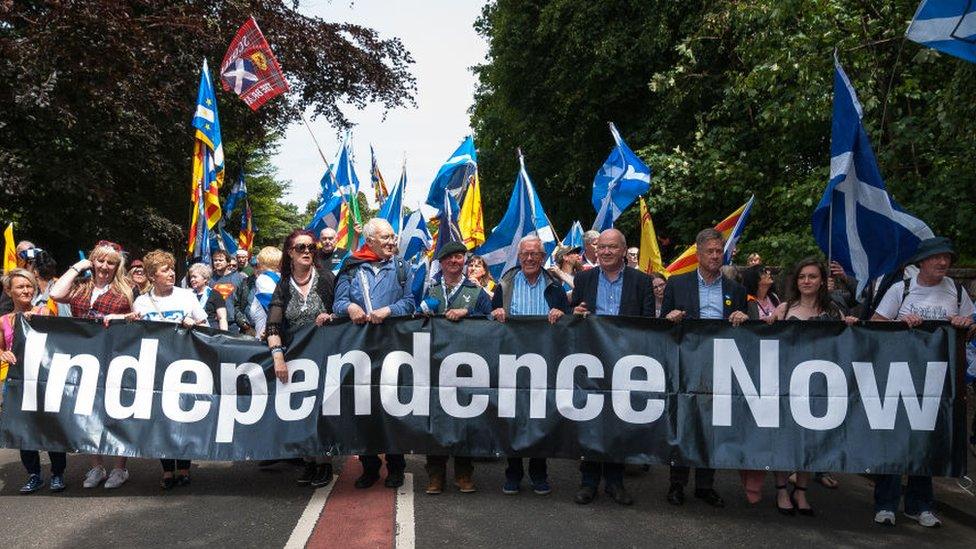Scottish independence: How Nicola Sturgeon was 'cheeky with history'
- Published
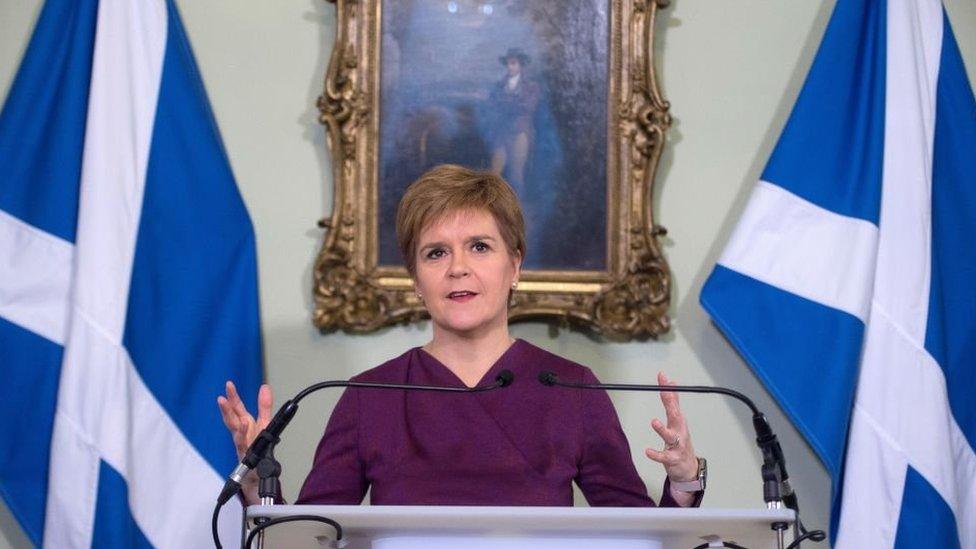
First Minister Nicola Sturgeon said a second referendum is the will of the people
Nicola Sturgeon pronounced herself to be in a relaxed mood as she presented her formal request to the UK government for a fresh referendum on Scottish independence. She certainly looked and sounded less than stressed.
Perhaps it was this chilled demeanour which encouraged her to be a little cheeky with history. Ms Sturgeon revisited the attitude taken by the cross-party constitutional convention - the grouping which prepared the path for the devolved Parliament.
In particular, she recalled a famous speech made by Canon Kenyon Wright, the polite but persistent cleric who chaired the convention's executive committee.
Referring without name to Margaret Thatcher, he intoned: "What if that other voice we all know so well responds by saying 'we say no and we are the state'? Well, we say yes - and we are the people."
It was decidedly powerful at the time, March 1989, and set the tone for the quiet determination of the wider convention. I know 'cos I was there.
One tiny thing. The SNP withdrew from that convention at an early stage, on the grounds that it was not sufficiently open to the possibility of independence. They played no part in its deliberations.
So it is perhaps just a mite mischievous - no more - for Ms Sturgeon to cite the convention and that speech in adducing an argument for cross-party consensus in pursuit of a further referendum.
I say "just a mite" and I mean it. For one thing, the convention was largely driven by Labour's decision to participate. They were, then, the primary force in Scottish politics.
Labour, frankly, did not want the SNP to take part in the convention and many of their number breathed a sigh of relief when the Nationalists withdrew.
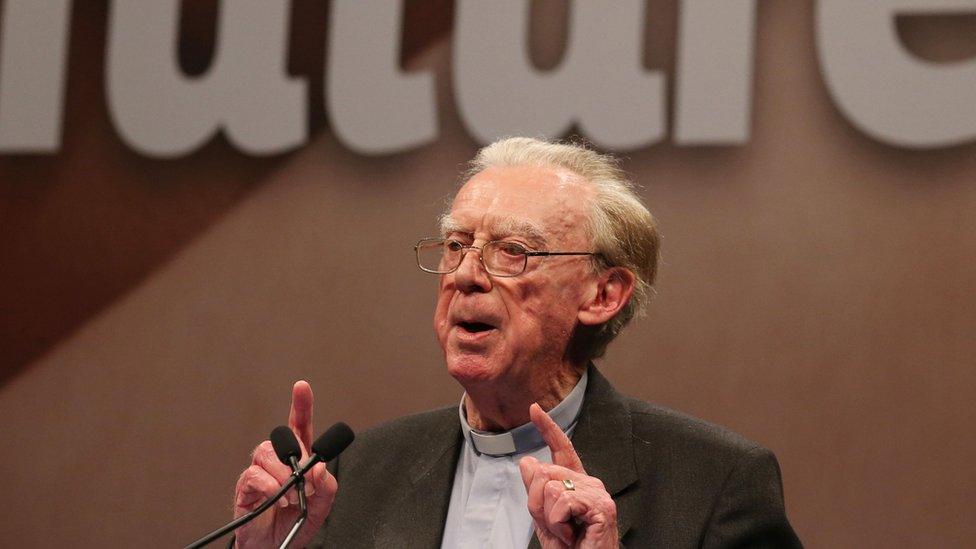
Canon Kenyon Wright was an instrumental figure in the creation of the Scottish Parliament
Secondly, the SNP did play a significant part at a later stage, in backing a Yes/Yes vote in the devolution referendum of 1997. Prior to that, Donald Dewar had deployed an agreed formula to the effect that, while his aim was devolved self-government, there was no ceiling upon the constitutional objectives of the Scottish people.
So, ultimately, the non-Tory consensus was broadly based.
Still, back to today. Ms Sturgeon relies on one fundamental point - and a range of supplementaries. The fundamental point is that Scotland is a nation, with a full right of self-determination. She rightly notes that has formed a key part of decades of constitutional debate in Scotland. It was the basis of the convention.
And the supplementaries? These are chiefly designed to counter the Conservative point that the people of Scotland rejected independence in 2014 in a vote which was designed to last for a generation.
Both Ms Sturgeon and Alex Salmond regularly deployed that line about "once in a generation". It was also set out repeatedly in the Scottish government's independence White Paper which noted, inter alia that the referendum was "a rare and precious moment in the history of Scotland, external - a once in a generation opportunity to chart a better way."
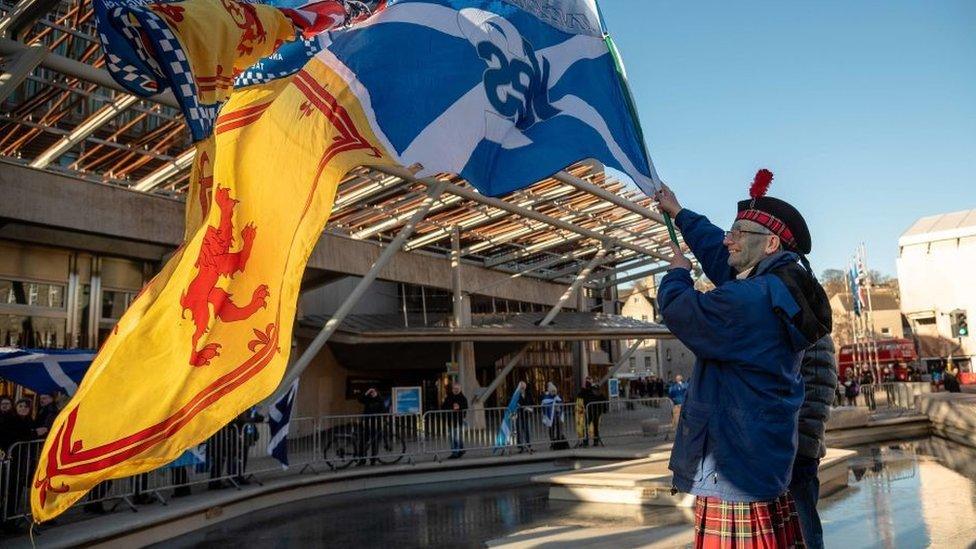
The Scottish government document published today tackles that. It says there has been a "material change of circumstances" since that vote in 2014, thus activating the SNP manifesto promise to revisit the referendum in such an eventuality.
The change? Brexit, of course. The Unionist offer in 2014 was predicated upon continuing membership of the EU and, indeed, an argument that this was the only way for Scotland to sustain that European link.
The UK is now on the verge of leaving, given the Conservative majority. Ms Sturgeon said that the union on offer to the people of Scotland in 2014 will no longer exist. It will be a union sans EU. She said further that the question of EU membership had been central in indyref1.
Further, she deployed an argument she evinced during the recent election - to the effect that Brexit was but one example of the UK's neglect of Scottish opinion and interests.
Finally, that election itself. Ms Sturgeon said her party had advanced - while the Scottish Tories had lost votes and half their seats on a platform of seeking to thwart indyref2.
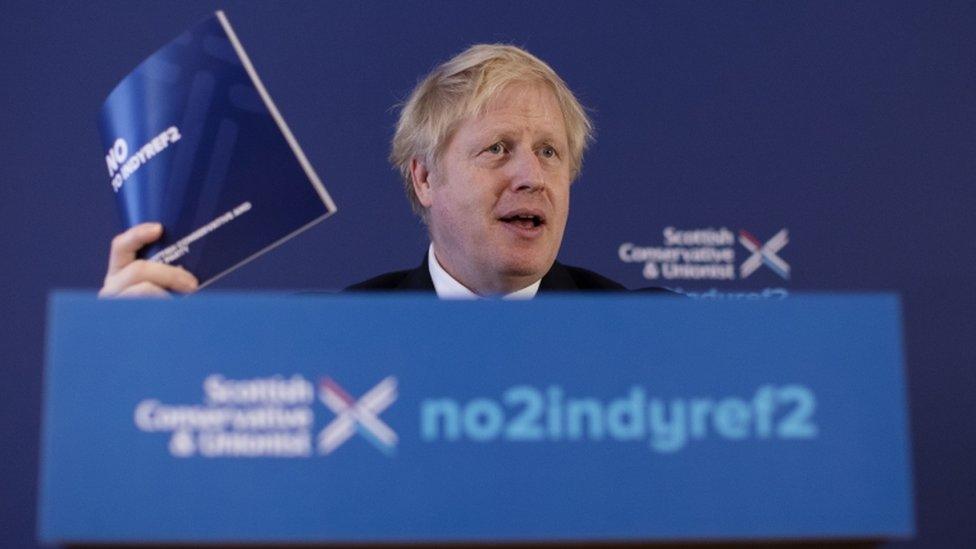
Prime Minister Boris Johnson at the launch of the Scottish Conservative manifesto in Inverkeithing, Fife
Now, I have discussed the issue of competing mandates in an earlier post. Suffice it to say for now that the Tories, while uncomfortably aware of their Scottish standing, are inclined to focus more upon their UK victory, gained in a campaign in which Boris Johnson promised an end to referendums, either of the Scottish or European variety.
But, as I discussed earlier, this issue is more one of momentum. Political momentum. Hence Ms Sturgeon's reply to me that the "dogs in the street" knew indyref2 was coming.
The only question, she said, was whether the Tories acquiesced or were obliged by persistent persuasion to concede the power to Holyrood to hold such a plebiscite.
I had asked her what weapons she had in the armoury to persuade Boris Johnson to change her mind. She talked of considering options with the passage of time.
Once again, a quote from King Lear came into my mind, and I did not push it away. "I will do such things. What they are yet I know not but they shall be the terrors of the earth". You see the problem instantly, of course. Energetic but imprecise.
To be clear, I do not remotely blame the first minister for this. A substantial part of her message, indeed, was designed to cool more ardent campaigners on her own side. To convince them that calm, considered reason can and will win through.
Next steps
So what might she do? An unofficial referendum? Explicitly ruled out in that it would not be legitimate and would not win UK or global sanction.
A law suit? A non-starter. The law is quite clear: the power to hold a referendum is currently reserved to Westminster. Ms Sturgeon wants to alter that, either permanently or again temporarily. But, for now, that's the law.
Civil disobedience? No.
So what might happen? Protest? Yes - demonstrations and marches. Another vote at Holyrood on the new document? Count on it early in the new year.
Plus a renewed attempt to win a broader Scottish consensus. Not for independence, per se. No, the consensus sought would be around the case for a referendum, for Scotland to choose.
Nicola Sturgeon stressed that her aim remained to hold indyref2 towards the end of 2020. But, in keeping with that chilled demeanour, she did not sound entirely dogmatic on that topic.
Which leads to one other possibility. That the SNP demand for indyref2 goes head to head with Tory opposition at the next Holyrood election in 2021.
You can see the snag for other parties in that, can't you? It might tend to polarise politics in Scotland, to squeeze out those other contenders. Privately, both SNP and Tory strategists might ponder, mischievously again, why that is remotely a problem for them.
- Published19 December 2019
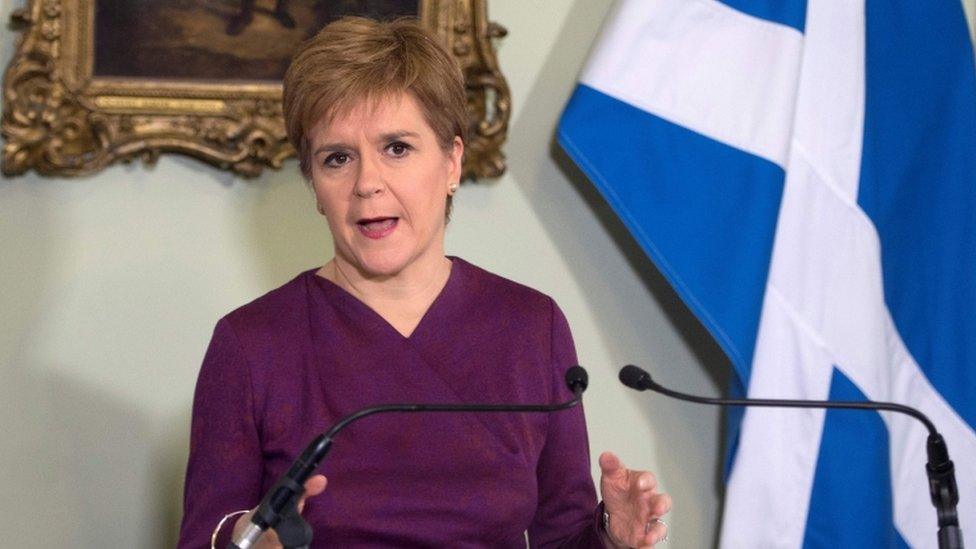
- Published19 December 2019
